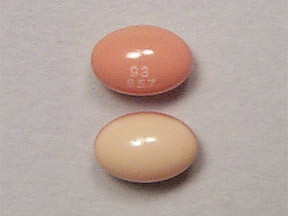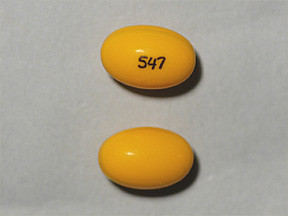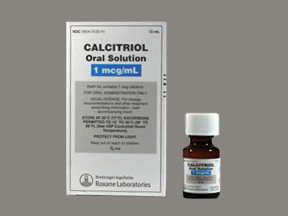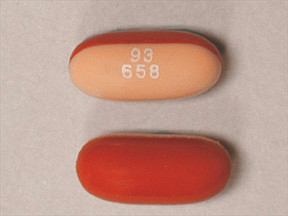CALCITRIOL - ORAL
PHONETIC PRONUNCIATION: (KAL-si-TRYE-ol)
COMMON BRAND NAME(S): Rocaltrol
GENERIC NAME(S): calcitriol
Uses
USES: Calcitriol is a man-made active form of vitamin D. Most people get enough vitamin D from exposure to the sun and from fortified food products (e.g., dairy products, vitamins). Vitamin D helps control parathyroid hormone and the levels of certain minerals (e.g., calcium, phosphorus) that are needed for building and keeping strong bones. Before regular vitamin D can be used by the body, it needs to be changed to the active form by the liver and kidneys. Calcitriol is used in patients with kidney disease who can't make enough of the active form of Vitamin D. This medication is also used to prevent and treat certain types of calcium/phosphorus/parathyroid problems that can happen with long-term kidney dialysis or hypoparathyroidism. Calcitriol is usually used along with specific diet recommendations and sometimes other medications.
How to use CALCITRIOL - ORAL
HOW TO USE: Take this medication by mouth with or without food, usually once daily or as directed by your doctor. If you are using the liquid form, measure your dose with a special measuring spoon or device. Do not use a normal household spoon since you may not get the correct dose. Dosage is based on your medical condition and response to therapy. Your doctor may start you on a low dose and adjust the dose slowly to find the best dose for you. Follow your doctor's directions carefully. Use this medication regularly in order to get the most benefit from it. To help you remember, take it at the same time each day. It is very important to follow the diet recommended by your doctor to get the most benefit from this medication and to prevent serious side effects. Do not take other supplements/vitamins (e.g., calcium, vitamin D) unless ordered by your doctor. Certain medications (bile acid sequestrants such as cholestyramine/colestipol, mineral oil, orlistat) can decrease the absorption of vitamin D. Therefore, separate your doses of these medications as far as possible from your doses of calcitriol (at least 2 hours apart, longer if possible). It may be easiest to take calcitriol at bedtime if you are also taking these other medications. Ask your doctor or pharmacist about finding a good dosing schedule that will work with all your medications.
Side Effects
Precautions
Interactions
Overdose
Images

- color
- yellow-brown
- shape
- oblong
- imprint
- 93 657
Reviews
Faq for CALCITRIOL - ORAL
Calcitriol is a form of vitamin D that is used to treat conditions caused by a lack of vitamin D, such as low calcium levels or certain bone disorders.
Calcitriol works by helping the body absorb calcium from the diet and regulate calcium levels in the blood.
Calcitriol is used to treat conditions such as hypocalcemia (low calcium levels), hypoparathyroidism (low parathyroid hormone levels), renal osteodystrophy (bone disease due to kidney problems), and osteoporosis.
Calcitriol should be taken exactly as prescribed by the doctor. It is usually taken once daily with or without food. It is important to follow the instructions on the prescription label carefully.
The common side effects of calcitriol include headache, dizziness, nausea, vomiting, stomach pain, constipation, and increased thirst. Serious side effects such as allergic reactions, high calcium levels, or irregular heart rhythm may occur in rare cases.
It is important to discuss with your doctor if you are pregnant or planning to become pregnant before taking calcitriol. The use of calcitriol during breastfeeding should also be discussed with the doctor.
Calcitriol may interact with certain medications such as antacids, cholesterol-lowering drugs, and medications that affect the immune system. It is important to inform your doctor about all the medications you are taking.
The time required for calcitriol to show its effect may vary depending on the condition being treated. It is important to follow the prescribed dosage and consult the doctor about any concerns.
If a dose of calcitriol is missed, it should be taken as soon as you remember. However, if it is close to the time for the next dose, the missed dose should be skipped. Doubling the dose should not be done to make up for the missed dose.
Disclaimer
IMPORTANT: HOW TO USE THIS INFORMATION: This is a summary and does NOT have all possible information about this product. This information does not assure that this product is safe, effective, or appropriate for you. This information is not individual medical advice and does not substitute for the advice of your health care professional. Always ask your health care professional for complete information about this product and your specific health needs.






No Reviews Yet